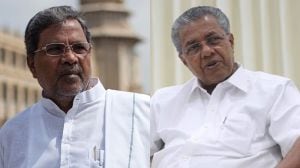It146;s Pak Shining, more straight than spin
They don8217;t drink in Pakistan 8212; officially, that is 8212; but if they did they would probably celebrate June 30 with champagne. On...

They don8217;t drink in Pakistan 8212; officially, that is 8212; but if they did they would probably celebrate June 30 with champagne. On that day, the curtain falls on one of the most successful years in the history of the Pak economy.
In some circles, they8217;re already joking it8217;s a case of 8216;8216;Pakistan Shining8217;8217;, borrowing a phrase now infamous here. That comparison may seem premature. At 3 trillion, India8217;s GDP is a heavyweight compared to Pakistan8217;s 300 billion little-league economy.
Yet, the Economic Survey and Budget 8212; introduced on June 12 and passed today by the Pak Parliament 8212; are good news bulletins. Pakistan8217;s days as a 8216;8216;basket-case8217;8217; 8212; Finance Minister Shaukat Aziz8217;s description of the situation when he took over in November 1999 8212; seem far away.
The Economic Survey said GDP grew 6.4 per cent in 2003-04, as against a target of 5.3 per cent. While agriculture was a relative laggard, manufacturing 13.4 per cent and services 5.2 per cent ballooned.
The 8216;8216;sharp acceleration in manufacturing growth8217;8217; came in for special mention: 8216;8216;Overall, manufacturing grew by 13.4 per cent in 2003-04 against a target of 7.8 per cent8230;Largescale manufacturing, which accounts for 68 per cent of overall manufacturing, exhibited broad-based growth of 17.1 per cent.8217;8217; Those are impressive numbers but don8217;t see them in isolation. Forex reseves were under 2 billion in 2000. Now they8217;re at 12 billlion, enough to 8216;8216;cover a year8217;s imports8217;8217; says the finance minister.
Inflation hasn8217;t crossed four per cent. Disinvestment 8212; Pakistan seems to prefer the IPO route, say officials 8212; is going along nicely, with Pakistan International Airlines8217; public issue opening in early June. The boom has ridden on the back of 8216;8216;banking reforms that began in 19978217;8217;, says says a bureaucrat. There is a change from the days when Pakistani bankers 8216;8216;lent money on personal recommendation and not credit worthiness8217;8217;.
Today consumer credit is available at five to six per cent. 8216;8216;Good companies,8217;8217; says Munawar Saeed Bhatti, Pakistan8217;s deputy high commissioner in New Delhi, 8216;8216;can borrow at three to four per cent.8217;8217;
Yet growth has not been even. A third of Pakistan8217;s 150 million still live in poverty. The Economic Survey8217;s contention that poverty has declined 4.2 per cent in a year is seen by critics as statistical jugglery. Unemployment is up from seven to nine per cent. Most new jobs are being created in services: telecom, media, restaurants. Sounds familiar, doesn8217;t it? Also defence allocation eats up Rs 194 billion of the Rs 903 billion budget. It has risen seven per cent over the previous year.
International agencies are not complaining, however. A World Bank report says, 8216;8216;Pakistan8217;s economic revival pogramme is beginning to show results.8217;8217; The Asian Development Outlook 2004, an Asian Development Bank report, says, 8216;8216;The foundation has been laid for significantly higher growth 8230; created fiscal space for the government to increase expenditures on poverty reduction and development.8217;8217;
The Pakistani government prepaid a high-cost 1.17 billion ADB loan three months ago. On June 11, it also announced it was not renewing an IMF-backed restructuring programme 8212; begun in 2000 8212; beyond 2004. In a region where the local currency8217;s value against the dollar still shapes popular sentiment, 57 Pakistani rupees now fetch a dollar, against 67 in the 9/11 period.
To Irfan Husain, a former Pakistani civil servant and now a columnist, Pakistan is reaping the benefits of America8217;s war on terror. One reason for healthy forex reserves, he says, is that 8216;8216;expats are now remitting finds through legal channels8217;8217;, rather than informal, hawala-type arrangements that are under suspicion.
Deputy High Commissioner Bhatti would agree. 8216;8216;In 2000-01, remittances from Pakistanis abroad added up to 1.3 billion. In 2002-03, they were 4.4 billion. This year they should touch 4 billion.8217;8217; Interestingly, the single-largest source of remittances in not the Gulf but the United States. In a completely haphazard polity, Pakistan owes its economic turnaround to, in essence, two men, both US-returned technocrats. Finance Minister Aziz was vice-president at Citibank in New York when Musharraf asked him to come home.
- 01
- 02
- 03
- 04
- 05































